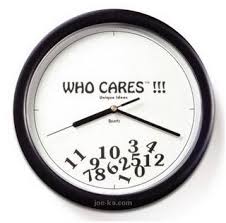In my last blog post I wrote about people who are late. I want to continue exploring this theme today.
Of course, all of us are late sometimes. And some of us are late much or even most of the time. Although some may consider this to be a minor problem, I think it is significant, in part because we can learn a lot about ourselves by understanding some of the “reasons” we are late.
So here’s my list. Which fit you?
Lack of consequences. This is a big one. Most of the time there are no rewards for being early/on time nor are there punishments for being late. A lack of significant consequences makes it easy to take punctuality lightly.
Inertia. It takes energy and responsibility to be on time. Some people lack the energy and inner motivation to arrive on time. They may be lazy not only about punctuality but in many aspects of their lives.
Adrenaline. Being habitually late, not only for meetings but events like catching a plane or attending a friend’s wedding, causes an emotional surge that some people crave. They hate boredom and enjoy the feelings that come with from rushing to events last minute.
Busy. Some people have an aggressive to-do list and get a rush out of seeing how much they can do in a day or an hour. They try to cram one more thing in before going to the next engagement and that one more thing ends up taking more time than they expected and consequently they are late.
Rebellion. Some people resent being controlled by others. Resisting control becomes a way of life for them that plays out in many ways, including tardiness. These people passively-aggressively act out their resentment in order to defy others and maintain a deception of control over their lives.
Obligation. Lots of folks, I’d say about 80%, live from obligation. They do what they do because they “have to” or “should” and so life gradually wears them down. They get tired of all the demands and so comply but only half-heartedly, often doing the minimum expected. This is reflected in many ways, including being late. (Worth a blog post on its own.)
Power. Some people’s tardiness is a way of letting others know of their importance or power. They believe that they are more important than others, their agenda is more important than other’s, and/or that the usual rules don’t apply to them.
Indifference. Some are late because they are indifferent to the impact of their tardiness of others. They may be egocentric and lack empathy about how their behavior affects others. It is not important to them.
Disengaged. This is very common and related to “obligation” above. Some people come late because they have no skin in the game. They are riders or followers but lack personal commitment or feel no sense of responsibility to the outcomes of an organization/relationship.
Culture. Many cultures accept being late. It is part of their identity. You’ve heard that such and such a group runs on _________ standard time. It’s almost a joke used to explain and justify the behavior.
Avoidance. Some are late because arriving early may mean either talking to others or waiting with nothing to do. Either of these brings up feelings which they want to avoid. It is easier to rush from this to that last minute to avoid getting in touch with their deeper feelings.
Optimism. It has been said that optimistic people are more likely to be late because they look at the bright side and don’t anticipate all that can go wrong. They cut it close rather than building in a little time for the flat tire, bad traffic, or conversation in the hallway.
Attention. Some like the attention of being late. Anything to get a little more of the spotlight whether the press is good or bad. After all, even bad breath is better than no breath.
Guilt. Some people feel guilty about just about everything. Being late gives them justification for feeling bad and one more reason to apologize.
This is the list I’ve come up with. As I stated before, it is not necessarily complete. Can you add more?
What About You?
Or can you see yourself in any of these “reasons,” especially if you’re frequently late? Which of them help explain your behavior? (Usually more than one will apply.) Think about this. Be honest with yourself. What can you learn that is not simply about being tardy but rather your approach to life?
Then you have to think about whether you’re okay with being late. Maybe you are, maybe not. Maybe it’s not worth giving up whatever you’re getting out of being late. After all, our behavior is purposeful. We get something out of whatever we do, little payoffs that reinforce us, even when counterproductive to a higher purpose.
So think about it—what are the payoffs you get out of being late and are you willing to give these up for something else? I want to suggest that this “something else” is not about time. It has to do with a deeper understanding of what drives your tardiness. Are you willing to give that up? And are you willing to be honest with yourself and others about what you say you will and won’t do rather than letting unconscious motives drive your behavior?
I’m not intending to be moralistic. I simply want to hold up a magnifying glass and invite you to take a deeper look. Are your personal norms around tardiness serving or hindering you from your highest goals?

